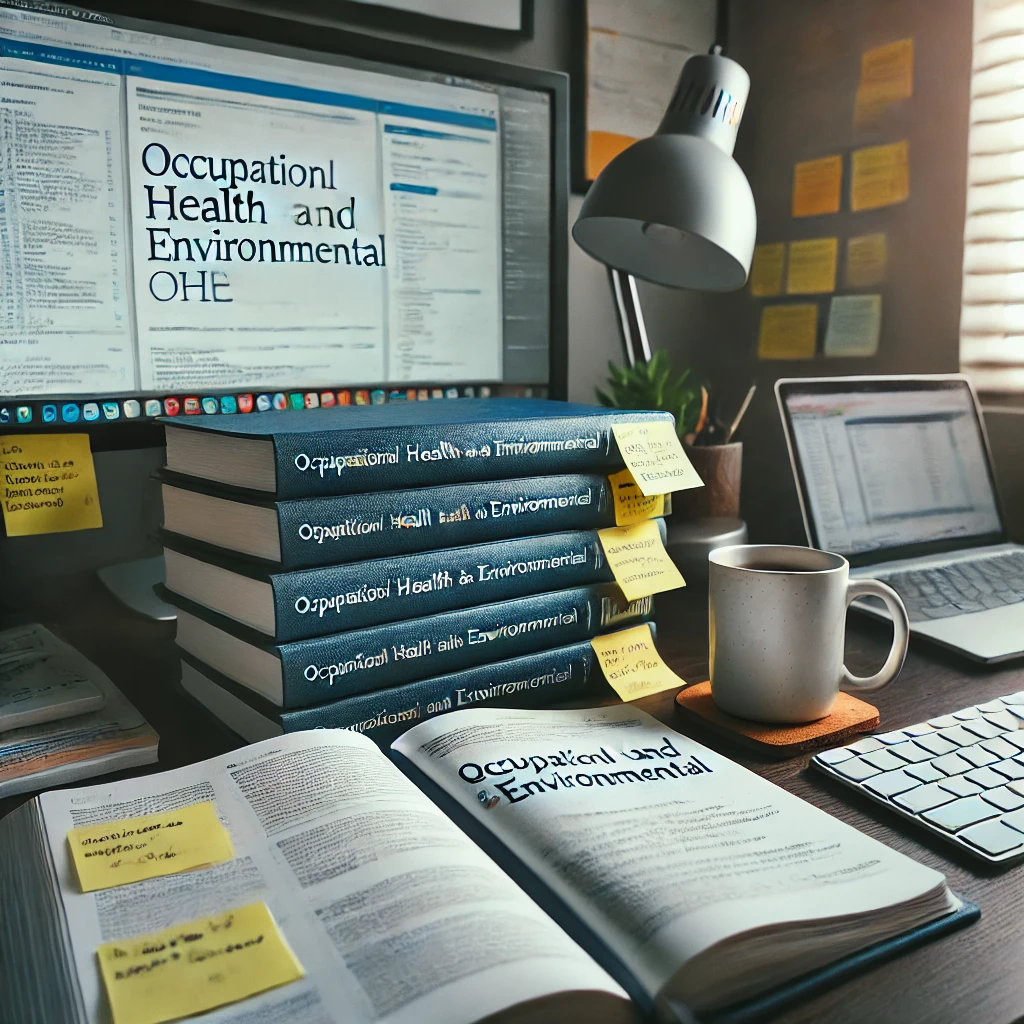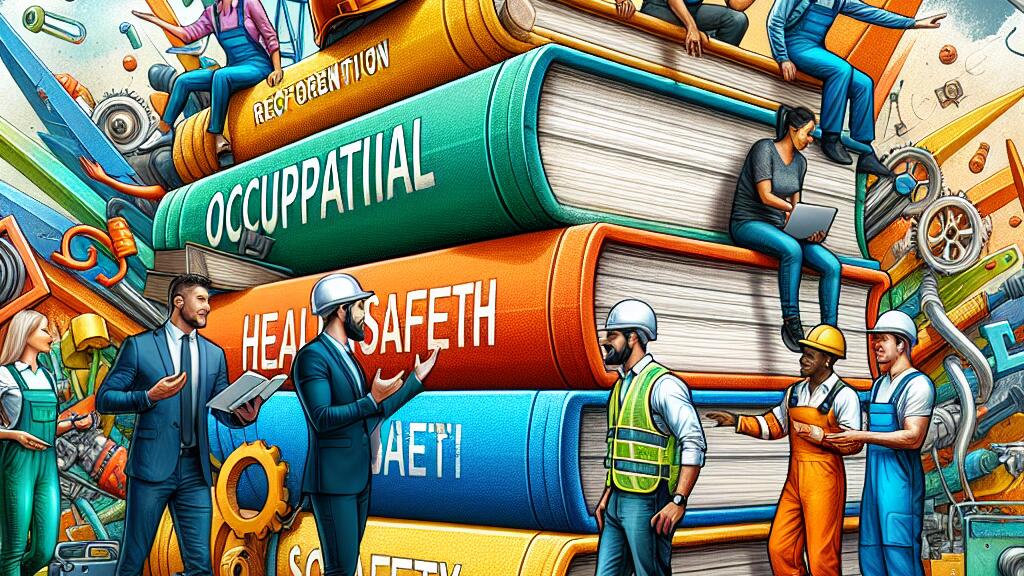Table Of Contents
Reference Books as Essential Tools for OHE Professionals in Enhancing Skills and Knowledge
Key Takeaways
- Reference manuals play a crucial role in the field of OHE, aiding professionals in their work.
- Important characteristics of impactful reference manuals enhance their usefulness in OHE tasks.
- Choosing appropriate reference manuals is vital for effective practices in OHE.
- Incorporating reference manuals into OHE operations improves overall efficiency and effectiveness.
- Utilizing reference manuals contributes significantly to professional growth and advancement in careers.
Reference Books As Essential Tools For OHE Professionals | Understanding the Role of Reference Books in OHE
Reference books serve as essential tools for OHE professionals, providing a wealth of information needed for effective practice. These resources encompass a variety of formats, including traditional books, e-books, audio books, and even scholarly journals, ensuring that professionals have access to diverse learning materials. By leveraging library catalogs to identify relevant titles, OHE specialists can select essential literature that enhances their knowledge base. The incorporation of these reference materials into daily practice not only supports ongoing education but also sharpens skills critical to success in the field. Understanding the role of reference books empowers OHE professionals to stay informed and effectively address the challenges they encounter.

Reference Books as Essential Tools for OHE Professionals | Importance of Reference Materials for OHE Professionals
Reference books serve as essential tools for OHE professionals, providing valuable resources that are often unavailable elsewhere. Libraries play a crucial role in this regard, housing a diverse collection of literature that includes encyclopedias, biographies, and specialized manuscripts. These reference materials help professionals stay up to date with the latest research and best practices in the field, ensuring a solid foundation of knowledge on which to build their careers.
The integration of reference books into daily practice is vital for OHE professionals seeking to enhance their expertise. By utilizing these resources, professionals can access comprehensive information that supports their decision-making processes. Reference books as essential tools for OHE professionals not only enrich an individual’s knowledge but also contribute to the overall effectiveness of OHE initiatives, fostering better outcomes for communities and populations served.
Types of Reference Books for OHE
Reference books serve as essential tools for OHE professionals, offering a variety of formats to meet diverse needs. Handbooks provide practical guidance on specific topics, while catalogs can streamline access to extensive resources. Humanities-focused reference materials often include bibliographies and citations, enabling researchers to navigate academic landscapes effectively. These tools enhance the ability to conduct thorough research, making them indispensable in the field of OHE.
The spectrum of reference books for OHE encompasses not only theoretical knowledge but also practical applications. Hand tools, such as instructional manuals and how-to guides, help practitioners apply concepts in real-world scenarios. Accessing well-curated bibliographies allows OHE professionals to build a solid foundation of knowledge, ensuring they stay informed and effective in their roles. Reference books as essential tools for OHE professionals ultimately contribute to their expertise and success in various projects.
Key Features of Effective Reference Books
Effective reference books serve as critical resources for OHE professionals, offering a blend of comprehensive information and practical utility. These works often encompass classics in the field, alongside biographies of influential scientists and innovators, providing insights that transcend simple facts. They include specialized dictionaries, aiding in the understanding of complex terminology associated with various sciences. Manufacturers and cutting tools are frequently detailed, showcasing the latest advancements and applications. By consolidating such vital knowledge, reference books emerge as essential tools for OHE professionals, empowering them to make informed decisions and foster ongoing development in their careers.
- Comprehensive coverage of key topics and concepts
- Inclusion of biographies to contextualize historical and modern advancements
- Specialized dictionaries to decode complex terminology
- Detailed descriptions of manufacturers and cutting tools
- Up-to-date information reflecting the latest advancements in the field
- User-friendly organization and navigation for quick reference
- Recommendations for further reading and resources for continuous learning
Comprehensive Information and Depth of Content
Reference books serve as essential tools for OHE professionals by providing comprehensive information across various disciplines. These resources cover an extensive range of topics such as medicine, botany, and science, making them invaluable for ongoing education and practical application. High-quality reference materials include detailed insights into specialized fields like machine tools and material handling. Such depth empowers professionals to gain a thorough understanding of their areas of expertise, enabling them to implement best practices effectively.
The value of depth in content cannot be overstated, especially within laboratories and research environments where precision and accuracy are critical. Reference books as essential tools for OHE professionals boast extensive bibliographies and subscription resources that keep the information current and relevant. By enabling practitioners to access intricate details and up-to-date findings, these books enhance decision-making capabilities and foster continuous learning in an evolving landscape.
UserFriendly Formats and Accessibility
Easy accessibility of reference books significantly enhances their utility for OHE professionals. For example, the UCLA library offers a wide selection of reference books that serve as essential tools for OHE professionals. These texts, along with various journals, provide comprehensive insights and data that are crucial for informed decision-making in the field. The design of these materials often prioritizes user-friendly formats, allowing professionals to locate and utilize information quickly.
The layout and organization of reference books can make a significant difference in their accessibility. Effective reference books often feature clear headings, indexes, and visual aids that facilitate navigation. Accessibility goes beyond physical formats; digital versions of reference books available through libraries also enhance accessibility for OHE professionals. With these resources at their fingertips, they can efficiently enhance their knowledge base and apply new insights directly into their work.
Selecting the Right Reference Books for OHE Work
Choosing the appropriate reference books is crucial for OHE professionals aiming to enhance their expertise and knowledge. These Reference Books as Essential Tools for OHE Professionals should offer comprehensive literature citations and cover a broad library catalog scope. A well-curated manual can serve as a guide, leading practitioners to relevant business book titles and critical scientific biographies. Engaging with specialized library searches allows experts to discover invaluable resources tailored to their needs. Investing in the right reference materials not only enriches their practice but also reinforces the foundational role of reference books in the ongoing development of OHE professionals.
Criteria for Evaluating Reference Books
Evaluating reference books as essential tools for OHE professionals involves assessing the relevance and applicability of the content to specific disciplines. A quality reference book should provide comprehensive coverage of the subject matter, ensuring it supplies the necessary information for effective practice. Standard handbooks and archived materials often serve as foundational resources, but it is crucial to consider how current these products are, especially in fast-evolving fields like OHE.
Another critical criterion is the structure and usability of the reference book. Resources that are well-organized and easy to navigate can greatly enhance learning and application. Safari tech books, for example, are designed with user accessibility in mind, often featuring clear indexing and cross-referencing capabilities. Reference books as essential tools for OHE professionals should not only inform but also facilitate practical use in everyday scenarios.
Recommended Titles for OHE Specialists
A diverse collection of reference books is crucial for OHE professionals seeking to enhance their expertise. Classic text cases, such as “Health Behavior and Health Education” and “Community Nutrition in Action,” serve as foundational guides that provide essential insights into public health strategies. Publishers offer a wealth of resources that not only cover theoretical aspects but also present practical applications relevant to OHE practices. These books are invaluable accessories for professionals aiming to stay informed and effective in their roles.
Several specific titles can significantly benefit OHE specialists in their daily tasks. “The Public Health Handbook” and “Social Marketing in Public Health” are excellent examples of reference books that function as comprehensive guides. Following catalogs that feature these works can streamline the selection process for those professionals seeking the best resources. Reference Books as Essential Tools for OHE Professionals emphasize the importance of having the right material on hand to support evidence-based decision-making and continuous professional development.
- “Health Promotion Strategies Throughout the Life Span” to understand health promotion across different age groups
- “Introduction to Health Behavior Theory” for insights into behavioral change theories
- “Public Health Nutrition” for guidance on nutritional interventions and public health policies
- “The Community Tool Box” for practical tools and strategies for community health improvement
- “The Essentials of Health Policy and Law” for understanding the legal aspects of public health
- “Behavioral Science in Medicine” to explore the intersection of health behavior and medical practice
- “Program Planning for Public Health: A Practitioner’s Guide” for hands-on planning strategies and tools
Integrating Reference Books into OHE Practices
Reference Books as essential tools for OHE professionals serve as invaluable resources within academic and practical settings. Scholars and practitioners often turn to these comprehensive collections, found in university press libraries, to support their studies and research. These books feature detailed articles and case studies that span multiple pages, offering insights and practical applications of theories in real-world scenarios. With various editions available, professionals can access the most current information and methodologies, enhancing their understanding and effectiveness in the field. The integration of these reference materials into OHE practices not only enriches knowledge but also fosters continued professional development.

Utilizing Reference Books for Continuing Education
Reference books serve as essential tools for OHE professionals, particularly for ongoing education. Faculty members often rely on these resources as authoritative sources that provide comprehensive information on various topics. With many reference books available in online collections, professionals can access full-text articles and pre-publication materials that enhance their understanding of critical issues in their field. The ability to quickly reference these materials can significantly support the learning process and inform practice.
To stay current, OHE professionals are encouraged to incorporate reference books into their continuing education strategies. By selecting relevant titles and utilizing them as resources, professionals can expand their knowledge base and sharpen their skills. These reference books not only serve as valuable sources of information but also foster a culture of lifelong learning essential in the dynamic landscape of OHE. Reference books as essential tools for OHE professionals facilitate the exchange of ideas and best practices, making them indispensable for career growth.
Case Studies of Reference Books in OHE Projects
Reference books serve as essential tools for OHE professionals by providing a robust source of information that meets general requirements across various projects. These resources often contain technical specifications that guide practitioners in their work. A well-curated multi-disciplinary collection allows OHE professionals to shop for the specific information they need, ensuring that they adhere to the highest standards in their projects. Such reference materials can also enhance decision-making processes by offering detailed insights into unique project specifications.
Real-world case studies illustrate the indispensable role of reference books in OHE projects. For example, professionals engaged in urban planning frequently reference comprehensive guides to navigate complex zoning regulations and compliance requirements. These reference materials not only equip OHE specialists with the knowledge necessary to meet project demands but also highlight the importance of having access to trusted sources that reinforce best practices within the industry. Reference books as essential tools for OHE professionals provide the foundation for informed decision-making and effective project execution.
Benefits of Reference Books for Career Development
Reference Books as Essential Tools for OHE Professionals offer invaluable support in enhancing knowledge and skills relevant to the field. Engaging with pre-publication titles and packages of curated materials allows OHE professionals to access the latest research and advancements in technology. These resources provide searchable engineering content that streamlines the learning process and aids in applying theoretical concepts to real-world projects. By utilizing a variety of reference materials, professionals can develop a well-rounded understanding of industry standards and best practices, ultimately fostering career growth and expertise in the dynamic landscape of OHE.
| Reference Book Title | Author(s) | Publication Year | Key Focus Area |
|---|---|---|---|
| Engineering Fundamentals: An Introduction to Engineering | Saeed Moaveni | 2017 | Basic Engineering Principles |
| Project Management for Engineering and Construction | Chris Hendrickson | 2008 | Project Management |
| Electrical Engineering: Principles and Applications | John Morris | 2019 | Electrical Engineering Concepts |
| Software Engineering: A Practitioner’s Approach | Roger S. Pressman | 2021 | Software Development |
| Fundamentals of Engineering Exam Review | Michael R. Lindeburg | 2020 | Exam Preparation |
Enhancing Knowledge and Skills
Reference books serve as essential tools for OHE professionals, providing a wide range of titles that cover various aspects of the field. These resources allow practitioners to access comprehensive information quickly, facilitating research and decision-making in their business and academic endeavors. Professionals search for texts that offer depth and clarity, ensuring a solid understanding of the complex issues that arise in their work.
The scope of reference materials available goes beyond basic knowledge, equipping OHE specialists with advanced insights and methodologies. By incorporating these books into their ongoing education, professionals can refine their skills and stay updated on the latest trends and practices. The value of these titles extends to enhancing critical thinking and problem-solving abilities, which are vital for success in the dynamic environment of OHE.
Conclusion
Reference books serve as essential tools for OHE professionals, providing invaluable resources for both staff and students. These materials enhance understanding and support the continuous development of skills necessary for effective practice in the field. By offering comprehensive information, they empower professionals to tackle complex challenges and stay informed about the latest advancements in OHE. Incorporating reference books into educational programs and professional development initiatives fosters a culture of learning, ensuring that all involved can leverage these vital resources to improve their expertise and service delivery. Reference books as essential tools for OHE professionals ultimately play a pivotal role in shaping a competent and knowledgeable workforce.
FAQS
Why are reference books like dictionaries or scientific biographies important for OHE professionals seeking archival material in a university press library?
Reference books, such as dictionaries and scientific biographies, are essential tools for OHE professionals because they provide access to accurate information and foundational knowledge. When looking for archival material in a university press library, these resources can aid in the purchase and verification of credible data, enhancing the overall quality of research and documentation.
How do dictionaries and scientific biographies support clinical research for OHE professionals?
Dictionaries and scientific biographies play a vital role in supporting clinical research for OHE professionals by providing accurate definitions and comprehensive insights into specific terms, as well as detailed accounts of notable figures in the field. By consulting a dictionary, OHE professionals ensure they are using precise language, while scientific biographies offer context and historical perspectives that can enrich their understanding of research topics.
How do scientific biographies enhance the professional development of OHE professionals?
Scientific biographies play a crucial role in the professional development of OHE professionals by providing insights into the lives and contributions of influential figures in the field. These biographies not only highlight the challenges faced by notable scientists but also inspire OHE professionals to pursue innovation and excellence in their own careers.
How can OHE professionals utilize a scientific biography to enrich their understanding of their field?
OHE professionals can utilize a scientific biography to gain insights into the lives and contributions of influential figures in their field, which can enhance their appreciation of historical contexts and advancements. By studying a scientific biography, they can learn about the challenges faced by notable professionals, which may inspire their own career paths and professional development in the realm of oral health education.
What role do reference books play in the ongoing education and skills development of OHE professionals?
Reference books are crucial for OHE professionals as they provide foundational knowledge, updated industry practices, and insights that facilitate ongoing education and skills development. These tools help professionals stay informed about the latest trends and methodologies in their field, enhancing their ability to serve clients effectively.
